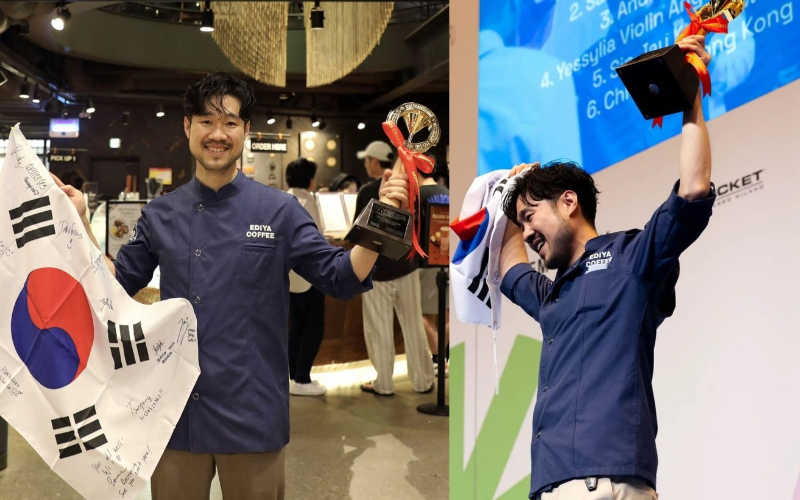- 한국어
- English
- 日本語
- 中文
- العربية
- Español
- Français
- Deutsch
- Pусский
- Tiếng Việt
- Indonesian
By Honorary Reporter Debolina from India
Photos = Wi Seung Chan
The annual World Coffee in Good Spirits Championship (WCiGS), which honors innovations in coffee and spirit mixology, was held from June 27-29 in Copenhagen, Denmark.
Korean barista Wi Seung Chan took home the grand prize thanks to his use of traditional Korean fermentation techniques in his coffee and liquor.
The following are excerpts from an email interview with Wi from July 5-7.

Wi Seung-chan on June 29 celebrates after winning this year's World Coffee in Good Spirits Championship in Copenhagen, Denmark.
Briefly introduce yourself and how you felt after winning the WCiGS.
I've worked at Ediya Coffee Lab in Seoul since 2017. My passion for specialty coffee has exposed me to a wide range of types, fueling my growth as a barista.
Winning the WCiGS was an indescribable experience. I felt pure happiness, gratitude for my supportive colleagues and pride in my hard work, especially since the win was unexpected.
What was your biggest challenge at the competition?
The biggest challenge was how to convey cultural differences. I used cheongju (clear liquor), a drink familiar to Koreans but I had to think a lot about how to introduce it to an international audience. So I prepared it for the judges by first introducing it as rice wine.
How did you think of using a fermentation starter?
I wanted to introduce my cultural background and the effect of fermentation on taste. It's very dangerous to offer anything other than designer drinks at the competition. But I thought the judges would consider this a good example of fermentation's effects on a drink, and this strategy worked.
What is special about this fermentation starter?
I used nuruk, a traditional fermentation starter to make makgeolli (milky rice wine) or cheongju. It resembles dough germinated by microorganisms from grains such as wheat, barley or rice.
The Japanese method uses koji to convert rice into sugar and later yeast to convert the sugar into alcohol. But nuruk performs both tasks in one simultaneous process, so it's more like wild yeast and can also be used at lower temperatures. Low-temperature fermentation has a positive effect on coffee fermentation, as it produces a more fruit-like fragrance.
Can you describe the drink you made with the fermentation starter?
The coffee had a more fruity and floral flavor. I made a coffee cocktail using rice wine again made from nuruk for the judges. It was highly praised for its connectivity and creativity.
How do you balance creativity and consistency in your creations?
The most important thing is connectivity. When you add a different flavor to your profile, it should be well connected. If it doesn't harmonize well, you should approach the combination another way.
Share a memorable experience from this championship.
The competitors shared our drinks backstage and took the time to understand each other's cultural backgrounds. And that's the real goal of an international competition.
What tips do you have for making great coffee at home?
Use tools. Always use scales and thermometers to precisely measure water temperature and amount of coffee to quantify the taste of any coffee you like in particular.
msjeon22@korea.kr
*This article is written by a Korea.net Honorary Reporter. Our group of Honorary Reporters are from all around the world, and they share with Korea.net their love and passion for all things Korean.